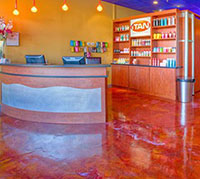Antimicrobial Floor Coating
Concrete is a porous material and thus provides an ideal breeding ground for harmful microorganisms to thrive. Commercial and industrial areas counteract this by installing an antimicrobial floor coating.
Antimicrobial floor coatings impede the growth of microbes keeping the concrete floor healthy and safe. Epoxy floor coating is one of the most popular antimicrobial floor coatings that can resist the growth of microbes, fungi, molds, spores, and bacteria making in ideal in:
- Restaurant and industrial kitchens
- Pharmaceutical Laboratories
- Food and Beverage manufacturing plants
- Medical facilities
- School cafeterias
- Office spaces
- Commercial buildings
- Showrooms
- Garage floors
- Animal care centers
Antimicrobial floors are the best flooring options for areas where cleanliness and good hygiene are extremely important.

Antimicrobial Floor Coatings
Antimicrobial floor coatings have the capability of improving air quality in an area. These environments prevent the growth of harmful pathogens. Other than that, antimicrobial floor coatings also come with these benefits:
- Durable
- Aesthetically beautiful
- Non-allergenic
- Food safe
- Minimal to no emission of VOC
- No odor transfer
- Skid resistant
- Water resistant
- Resistant to high foot and vehicle traffic
- Can withstand heavy loads and equipment
- Non-corrosive
- Easy to clean and maintain
- Can withstand vigorous and repeated cleaning
- Long-lasting
- Easy to install
- Approved by the USDA
For many commercial establishments and industrial facilities, an antimicrobial floor coating is a strict requirement of the FDA and USDA. Epoxy and polyurethane-based flooring solutions are two of the most ideal antimicrobial floor coatings.
HOW ANTIMICROBIAL FLOOR COATINGS WORK
An antimicrobial floor coating comes with an antimicrobial agent that shields the environment from these harmful microorganisms:
- Fungi
- Bacteria
- Molds
- Mildew
- Worms
- Protozoa
- Yeast
- Viruses
An antimicrobial floor coating comes with characteristics and properties allowing it to deal with harmful microorganisms in the environment.
Seamless and Non-Porous
The concrete floor needs to be seamless and non-porous for it to be resistant to the growth of fungus and bacterial. An epoxy flooring system is seamless and non-porous thus harmful organisms and moisture do not have a safe place to thrive.
Built-in Biostatic Effects
Antimicrobial floor coatings contain built-in biostatic effects from a silver-based additive that kill molds, mildew and any fungi including algae, yeast, and bacteria.
Antimicrobial properties contained in an epoxy flooring system are slowly released thus they continuously kill harmful microorganisms for the entire lifespan of the flooring system.
Concrete Floors and Microbes
Concrete floors are porous surfaces. Correspondingly concrete floors transmit and retain moisture. Thus, water seeps into the cervices of the concrete floor providing a source for contaminants to thrive.
Furthermore, concrete floors have damp and dark capillaries making them a perfect breeding ground for microbes.
An antimicrobial floor coating offers concrete floors extra protection to prevent the growth of these contaminants.
Antibacterial Floor Coatings and Food Safety
Food manufacturing plants as well as commercial and industrial kitchens are exposed to numerous corrosive by-products including fats, hot oils, sugar solutions, blood and food acids.
These by-products can easily deteriorate a concrete floor in a clean environment resulting into the uncontrolled growth of bacteria. Microorganisms on the surfaces of these environments could easily transfer to the food during preparation and processing.
All these contaminants should therefore be easy to wash away so they do not affect food safety. The floors should have a high hygienic condition to prevent the risk of contamination.
Floors in the food industry should therefore be seamless and non-porous for them to be easy to clean. Microorganisms should be controlled on the floors of areas in the food sector. An antimicrobial floor coating is designed to improve hygiene in these environments.
Laboratories, emergency rooms, operating rooms and patient rooms are always exposed to biohazards and pathogens. These contaminants can affect the health and well-being of patients and medical staff.
Stringent cleaning and sanitation requirements can damage standard flooring systems. An antimicrobial floor coating on the other hand can prevent the spread of bodily fluids, bacteria, viruses and other harmful substances in the area without causing damage to the floor.
Antimicrobial Epoxy Floor Coating
An antimicrobial floor coating works deep into the concrete surface. The antimicrobial formula seeps into the concrete surface during the curing process to be part of the concrete floor and not just on the surface. It prevents the growth of microorganisms in the concrete surface.
Antimicrobial epoxy flooring is also durable and slip resistant. It is also available in a wide range of colors.
Epoxy antimicrobial floor coating is approved by the USDA and FDA for use in flood processing plant, commercial and industrial kitchens as well as healthcare facilities.
This flooring system is also compliant to regulations set for Volatile Organic Substance (VOS) and Volatile Organic Compound (VOC) products.

